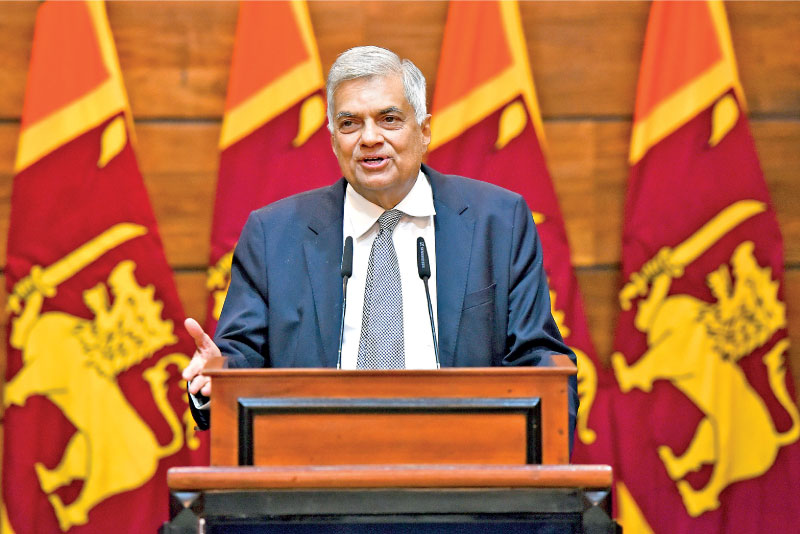Friday Feb 13, 2026
Friday Feb 13, 2026
Friday, 12 August 2022 01:45 - - {{hitsCtrl.values.hits}}

President Ranil Wickremesinghe
|
 The article I wrote titled “Ranil’s Destiny” and published in the Daily FT last week, had received the attention of a large number of readers; also there were several criticisms published against it. Many people in Sri Lanka seem to have lost the ability to think logically not only on the issue of the appointment of Ranil Wickremesinghe to the presidency but also on the issue of the crisis facing the country.
The article I wrote titled “Ranil’s Destiny” and published in the Daily FT last week, had received the attention of a large number of readers; also there were several criticisms published against it. Many people in Sri Lanka seem to have lost the ability to think logically not only on the issue of the appointment of Ranil Wickremesinghe to the presidency but also on the issue of the crisis facing the country.
I was surprised to watch a video where a leader of a leftist party was asking the expatriate Sri Lankans to refrain from remitting foreign currency to the country until the present rulers of Sri Lanka are changed. I understood this request to imply that it does not matter for them even if the country is destroyed until they come to power. The person who made this request belongs to a political party that appears to be gaining significant public recognition at the moment. How possible that a destructive approach like that could contribute to the benefit of that party and the nation?
Regrettably the struggle for securing the political power of the country is also being carried out in an atmosphere where the unique nature of the crisis facing the country has been completely ignored. When a house catches fire, the instant action taken should be to put out the fire immediately and not to look for those responsible for it. But what happened in Sri Lanka was to allow the fire to spread and to search for those responsible for it.
The way some people think of Ranil is also confusing. I am not a political follower of Ranil. There were times I have criticised him strongly; and also times I have praised him lavishly. Notwithstanding his limitations, he is the most colourful leader left of the old generation of politicians in our country. It is important that I should explain the ideological connection I have with him now. This connection has developed consequent to a consensus we have reached in regard to a structural reform program to be launched to bring about a profound change in the system. Late Mangala Samaraweera also took part in the initial discussions held in this connection; had he been alive today, he would certainly have been a strong supporter, a champion of the proposed reform program.
It was at the end of the internal civil war that I appeared strongly for a reform program that would bring about a profound change in the system. I was of the view that if Sri Lanka is not directed to a reform program, it will inevitably plunge into a crisis in which the country will become bankrupt and eventually end up in a state of anarchy. It took a long time of 12 years for my idea to be accepted by a head of state (President Gotabaya) of the country, and by that time, making my prediction a reality, the country had reached a state of bankruptcy and anarchy to a considerable degree. Now Ranil has assumed the position held by Gotabaya.
Ranil has been an important partner of our dialogue on the proposed reform program. He has a keen understanding of the reforms that the country needs. At this moment, what is more important for the country is not a change in government, but a change in the system. If he is prepared to open the doors for a reform program that will lead to a profound change in the system, what should we do? Should we obstruct his endeavour or extend our support for it? It is only through an election held after effecting essential reforms and not through a snap election held without reforms that it would be possible to create an atmosphere where respectable people could contest and win the election without resorting to black money.
Who should have been offered the presidency?
Ranil Wickremesinghe was elected the president by a parliamentary election at a time when Sri Lanka had reached the most critical stage of its crisis. The country was in a state of bankruptcy and failure. In view of the unbearable burden of life, shortages of essential goods, and people being compelled to stand in long queues to buy their basic requirements as a result thereof, a great unrest was developing in the society and parallel to it, the country was being pushed into a state of anarchy. President Gotabaya Rajapaksa had to abandon the presidency and flee the country when the youth uprising emerged more strongly in its second round amidst the oppressive economic background. Consequently Ranil Wickremesinghe was able to be elected as the President with a majority of votes polled by the members of parliament in an election held by the Parliament.
In this exercise, Ranil received not only the support of a large number of parliamentarians of the Pohottuwa, the ruling party, but also that of a considerable number of opposition members as well. However, there are various criticisms about his election. One such criticism is that the manner in which he was appointed the president is not ethical though it is in conformity with the Constitution. Only a presidential election can determine whether there is a public will or approval for his election. But according to the Constitution, in the event the incumbent president resigns or loses his position prior to the completion of his official term, it is Parliament and not the people that elect the next president for the remainder of the term.
At that special moment, the country needed a leader who had a vision and practical ability to steer the country out of the crisis it had plunged into. In that sense, he remained the best leader to have been chosen. There was no better alternative leader among the nominees for presidency, who could have been chosen for the task.
Criticisms against Ranil
President Ranil Wickremesinghe is neither a perfect nor a greatly popular leader. But in my opinion some of the harsh criticisms levelled against him are not justified. In 1996, President Chandrika Kumaratunga appointed a presidential commission to find out whether a torture chamber had been maintained at Batalanda government housing complex to detain and torture the suspects and to determine who should be held accountable if any illegal activities had taken place there. Ranil Wickremesinghe also testified before the commission; faced cross-examinations and consequently there was no prosecution against him. At that time, the Batalanda Commission was considered as a commission appointed by the United Front Government headed by Chandrika to tarnish and destroy the political image of the leader of the opposition.
During the second insurrection of the JVP, Chandrika and the leaders of her party were armed with weapons issued by the government in the face of threats to their lives from the rebels. At that particular period, not only the conduct of the government but also that of the rebels had assumed the form of an executioner. In that backdrop, the rebels and the government pursued a brutal policy, competitively, in killing not only their political enemies, but even those who appeared to be their potential rivals.
If the Batalanda episode was a powerful trump card which could have been used against Ranil effectively, in fact, it should have been used against him not today, but at two previous presidential elections held, one in the end of 1999 and the other in 2005. How can a trump card that had not been used then, be valid today after so long? It is important to note that Ranil has not played the role of a violator of human rights in both periods namely 2001-2004 and 2015-2019 when he ruled the country as the Prime Minister. These two periods of his administration can be considered as the two regimes in which there were no incidents of disappearances and accusations of human rights violations following the establishment of a presidential system of governance in 1978. If that is the historical reality associated with his previous regimes, how can it be fair for him to be highlighted as a cruel ruler?
The country’s economic growth took a negative turn following the LTTE attack on the Katunayake International Airport on 24 July 2001; it was Ranil Wickremesinghe who worked to overcome that situation and restore the economy when he became the Prime Minister after winning the 2001 general election. It can be cited as a special occasion where he has proved his ability to overcome a collapsed economy.
Lack of mature leaders
The problem of not having mature leaders who can perform a pioneering role can be considered as another important characteristic of the crisis Sri Lanka is facing. This is not something limited to the political sphere only; it can be considered as a characteristic extant everywhere including the state bureaucracy. The limitations inherent in the country’s education system may have had a direct impact on this situation, but it seems that the violent conflicts occurring in the country had the biggest impact on it.
There were a large number of prominent Sinhala and Tamil leaders among the people who were killed by the Sinhala and Tamil rebels and the security forces who suppressed those rebellions. Among them there were a certain number of young people who had the potential to become future leaders. That is why Sri Lanka has become a country devoid of mature political leaders. We have only Ranil Wickremesinghe left among the leaders who can be considered as advanced political leaders today. In the absence of mature leaders, it should be the country’s responsibility to make proper use of him at this critical juncture.
The challenges that the President has to face are huge, and extremely complex. He has to work in a corrupt system. The other important thing is that the president is compelled to work with a group of MPs of the other political parties in the absence of having a group of MPs of his own. Such a journey is more difficult and hazardous than walking on a tightrope high over the ground and a deep crevice lying underneath. If he falls, he will fall not alone, but with the whole nation. Those who laugh at him should not forget that.
Rampant corruption in all areas is a trend that has caused great anger in the people. Especially, failure to appoint qualified, honest and uncorrupt people to positions when appointments are made will certainly tarnish the image of the President and also diminish the ability to overcome the crisis facing the country. What I deem more important is whether the doors will be opened for a structural reform program that is required to effect a positive and profound change in the system. Only that can bring about a real transformation of the country. Then only that the country could be steered on a forward journey revved by a momentous driving force.
The extent of progress that Sri Lanka could achieve by building the Sri Lankan nation alone, thereby denying the recognition accorded to feudalistic caste system and ensuring equal human dignity and equal rights to all ethnic, religious, sexual, cultural and social groups, is enormous.